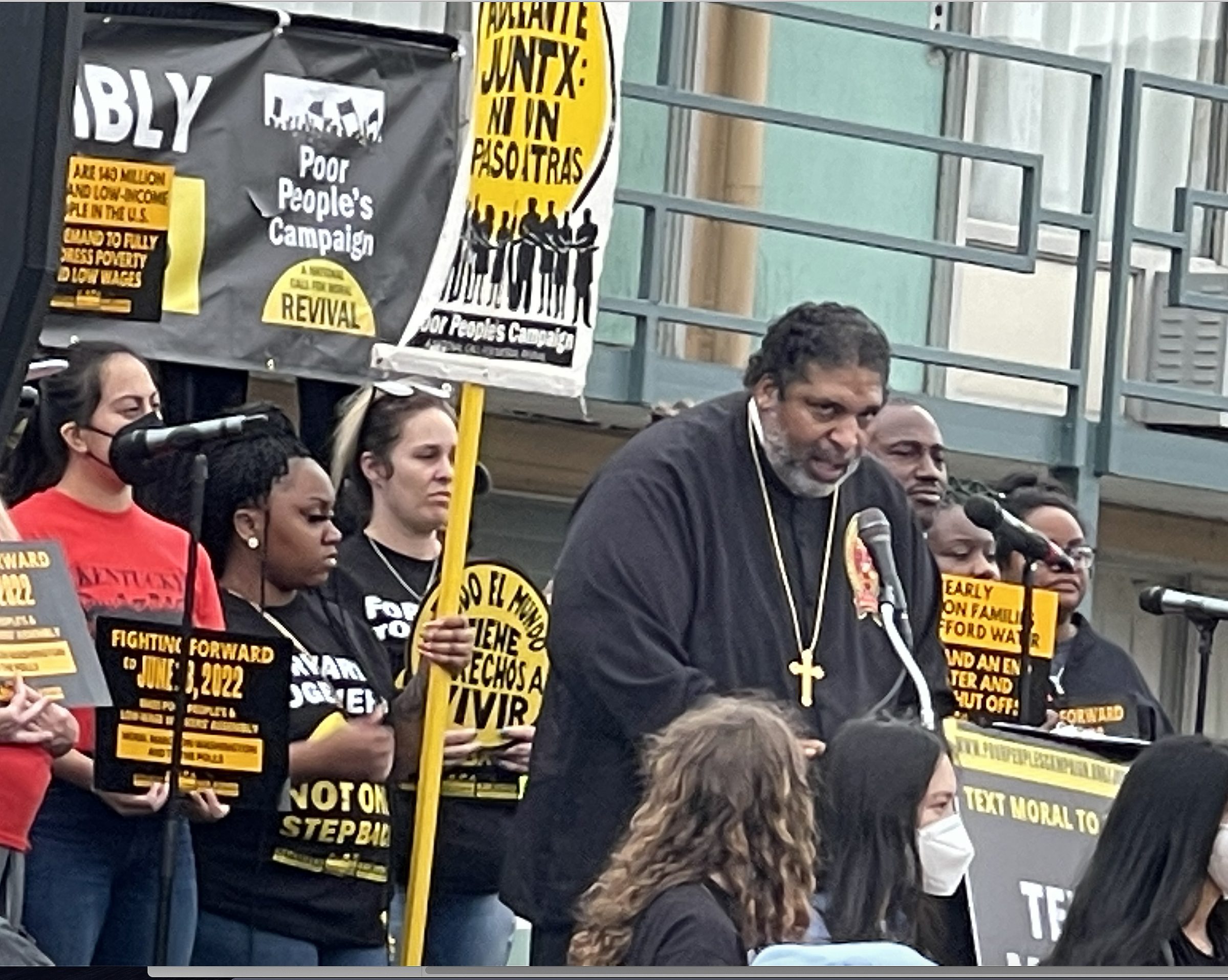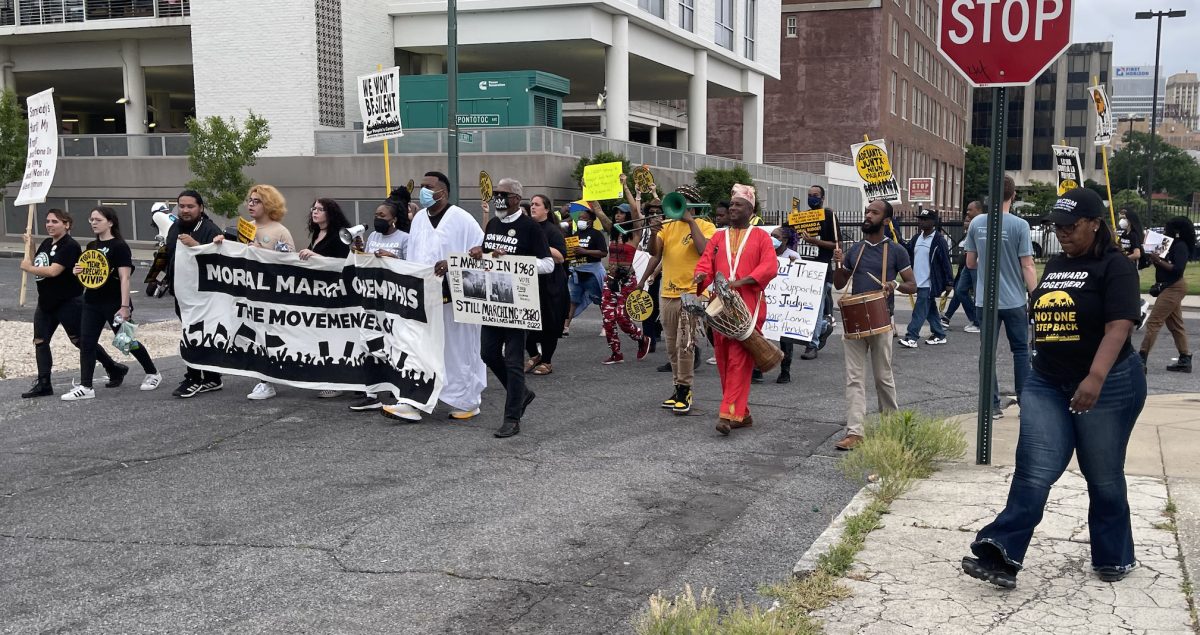There damn sure are two Americas. There is the America that venerates someone they call, somewhat archaically, “President Trump,” and plan, as billboards on our thoroughfares are now telling us, to convene with him right here in the area on June 18. And there is another America that won’t be at that meeting, an America whose sentinels — 1,000 to 1,500 strong — marched on Monday afternoon from Robert Church Park to the National Civil Rights Museum, chanting and singing.
“We are ready/ united we go/ bringing the power/ here we go/ all together/ here we go…,” they sang. And their signs told their mission — “The Poor People’s Campaign” — and their sentiments — “Everybody’s Got a Right to Live” (alternatively, “Todo El Mundo Tiene Derechos A Vivir”), and even some of their impossible presumptions — “Vote Out the Republican-Appointed Judges” and “End Capitalism.”
Yes, the Poor People’s Campaign. A revival of the very movement that the Rev. Dr. Martin Luther King, Jr. was on his way to creating when he was assassinated, just short of the mountaintop, here in Memphis more than half a century ago. And this reconvening, too, has a convocation slated for June 18. That one will take place in Washington, D.C., and Monday’s Memphis rally was intended as the last climactic prelude to that event.
There was more singing when the cadres gathered at the National Civil Rights Museum, there was a trumpet solo of “A Change Will Come,” and the clergy of three faiths — Christian, Jewish, and Islamic — celebrated the occasion, even throwing in a side reference to the Bhagavad Gita, thereby evoking yet another religion of humankind.
And there was the Rev. William Barber, who described himself modestly as “co-chairman of the Poor People’s Campaign” and began his remarks with a disclaimer: “I’m honored to be here with you today. … Nobody here is more important than anybody else. Ain’t no first, ain’t no seconds. We are just one.” He continued: “So I’m gonna ask three people from Mississippi, three people from Kentucky, maybe from Arkansas, three people in Tennessee — preferably some of those between 20 and 45 or so — run on up here and come stay with me. Because that’s another thing in the Poor People’s Campaign — we don’t ever stand at the podium alone because this is not about any one person.” After the requested assemblage sorted itself out and stood in place behind him, he began to do his best to make that last assertion — “We are just one” — a reality.

Make no mistake: Rev. Barber, not Al Sharpton of the Tawana Brawley caper and MSNBC, is the ranking social missionary these days among the black clergy, the successor-in-waiting to Jesse Jackson and, for that matter, to Dr. Martin Luther King. This bear-like man with basso profundo tones and a cadence that indeed seems to come straight from God. It is possible to extract from his hour-long message several shafts of golden rhetoric, and so we shall, but with this caveat: You had to be there, you always have to be there with Rev. Barber, the whole of whose message is always greater than the sum of its parts. He speaks with a hypnotic mantra that has to be experienced direct to be fully appreciated.
Nevertheless, for the record, here are some of the promised extracts:
Barber spoke to the “sacredness” of the venue this way: “The Bible says we gotta be careful because some people love the tombs of the prophets. But they don’t necessarily love the prophets and there are some folks that have come to the prophets’ tombs while they’re dead but would not dare come while they were still living.”
He made clear what he regarded as the source of his inspiration: “It was clear that we needed a mass assembly. This came after two national tours, visiting over 40 states being invited by the people. This was not a moment that some folk in D.C. decided they want to have and they start telling the people what to do. [It’s] the people from the bottom up.” And this was no mere ceremony: “You don’t need any more commemorations. We need re-engagement. We don’t need to keep talking about crucifixions, we need to start out as a resurrection.”
He dispelled what he saw as obstructive illusions to this resurrection: “If we were gonna be accurate, the truth of the matter is, Dr. King was hated. Dr. King was put out of the Baptist denomination. Threw him out! Preachers, civil rights leaders, and every major civil rights organization wrote resolutions against him when he connected poverty and racism and militarism, everyone. Even SCLC was split up. They were split [because] the poor folks campaign wanted to organize the wretched of the earth.”
Dr. King’s last sermon, the one written but never given, was entitled “America May Go to Hell,” he proclaimed.
Again: “Nothing would be more tragic than for us to turn back now. This is not about nostalgia. It’s not about just remembering the past.”
Neither Memphis as a community nor the state of Tennessee were spared: “It’s been 54 years since the sanitation workers strike and right here in Memphis they still don’t have union rights. … People in this city stopped a pipeline company that would damage the black community. There are attempts by that company to find other ways to bring toxic waste, and to get the legislature to write laws that would keep black communities from blocking the pipeline. We don’t need nostalgia. We need a movement now because nothing would be more tragic than to turn back now!”
Further: “You have a governor in this state who will go to black events and talk about Dr. King and how he loves Dr. King stuff [while] trashing everything Dr. King stood for. Talking about we need to get back to normal after Covid! You know what the hell normal was? Forty-six percent of all the people in Tennessee poor and low wealth. It’s 1. 3 million residents. It’s 56 percent of all the children in this state. 1 million black people, 2 million white people, 740,000 uninsured, 8,300 people homeless, 1.3 million people making under 15 dollars an hour, 51 percent of the workforce in Tennessee today work for less than a living wage. We don’t need no more notice. We need a resurrection!
“Before Covid hit, poor people were dying at a rate of 700 a day, a quarter million a year. And during Covid, poor people died at a rate two to five times higher than other folks. The virus didn’t discriminate, but we did: 8 million more people fell into poverty while billionaires have made over $2 trillion. We don’t need that. We need a resurrection!”
What was called for? “A living wage, guaranteed health care, guaranteed housing, just basic, fundamental human rights. … We’ve got less voting rights today than we had ever since 1960. … We’ve made a billionaire every 33 hours, every 33 hours a million people have fallen into poverty.”
Not that his concerns were restricted to the economic sphere: Barber condemned ” a form of theological malpractice in modern day terrorism. They claim that a agenda for God is hating gay people, being against abortion, being for guns, being for praying the schools and for a particular party whose name starts with R.”
There was more of the same, full of repetition and rolling thunder and dashes of humor (as when he invoked “ Shadrach, Meshach, and Abed-Negro”). And, after a final, extended crescendo, the Rev. Barber would close: “It is time to turn to your neighbor and say, ‘Neighbor, you know it’s time for me to go to the meeting … it’s time to get a hold of this nation. Are you ready?”
The minions he had addressed had already said, in their arrival chant, that they were.
